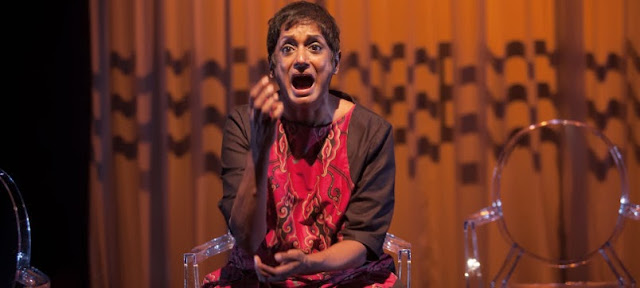Occupation
by Huzir Sulaiman
Checkpoint Theatre
Gallery Theatre, National Museum of Singapore
The Crystalwords score: 9/10
*This review was written for The Flying Inkpot.
Checkpoint Theatre
Gallery Theatre, National Museum of Singapore
The Japanese Occupation in Singapore was a time of suffering and strife. Yet, amidst all the adversity, life went quietly on. Indeed, if one looked hard enough, there were even moments of beauty and passion. Huzir Sulaiman's exquisite monodrama, originally commissioned for the Singapore Arts Festival in 2002, captures this very different side of the war: its capacity for reflection and new beginnings.
Occupation is the story of Huzir's grandmother, Mrs Mohamed Siraj, who lived through the war in Singapore as a teenager and miraculously found love in the form of a stranger next door. It is also the story of Sarah, a fictional oral historian tasked with documenting Mrs Siraj's experiences and who, in turn, reflects on her own complicated life and relationships. We move back and forth between these two very different women whose stories sit seven decades apart.
This intimate restaging at the National Museum is special in many ways. It marks the tenth anniversary of the play that led to the formation of Checkpoint Theatre, now a dynamic and colourful player in the local theatre scene. The National Museum also forms the ideal backdrop for a play that brings a vital slice of history to life. It is fitting that this production, starring acclaimed Malaysian actress Jo Kukathas, is directed by Claire Wong, who originated the role a decade ago. What made things even more memorable on the gala night performance was watching this production together with the real-life Mrs Siraj, a living testament to the survival of the human spirit.
Framed as a series of interviews with the elderly Mrs Siraj, the play introduces us to the latter's privileged upbringing. She tells of her cloistered childhood in a mansion of many windows, none of which her dominating mother allowed her to stand next to. We learn about her covert exchange of notes with a man living as a tutor with her next-door neighbor whom she eventually marries. Yet amidst these stolen glances and secret pleasures, we are constantly reminded of the war outside. Houses are looted, innocent men are shot and people are mercilessly tortured at the hands of the Japanese.
More complicated is Sarah, the bureaucrat who envies and even resents Mrs Siraj's wealthy background and warm, cherished relationship with her husband. These feelings are contrasted against Sarah's ambivalence towards her own career and difficulty in communicating with her volatile boyfriend. Sarah acts as a great contemporary foil to Mrs Siraj but this portrait of modern-day angst is not an especially groundbreaking one. It does not help that Sarah is given many verbose passages. These have a sweeping, poetic cadence that works well on the page but which has the tendency to come across as a little inauthentic when performed, even by an actress of Kukathas's calibre. This was a story that could have been pared down.
Better handled is the recurring theme in Occupation of the role of the Japanese. Huzir examines this topic with sensitivity and nuance. Despite her horrors at the wartime acts, one of Mrs Siraj's earliest memories is of a friendly Japanese silversmith who was constantly bowing. Later, she recounts a time when her mother encountered a young Japanese soldier who stands for a long time watching her cook, almost as if he just wants some human contact. Sarah also tells us about Mr Ogawa, a contemporary Japanese businessman who feels embarrassed for the actions of his compatriots decades ago and his government's stoic refusal to apologise for the war. At the heart of these anecdotes is a suggestion that these people are not intrinsically bad; it is circumstances that ultimately shape them.
 |
| Photo Credit: Checkpoint Theatre |
Part of the challenge of a script like this is the importance of giving words their right emphasis, stress and rhythms. Attention must be paid not only to what is spoken but more crucially, what remains unsaid. Kudos to Wong for drawing out the potential of the text, even down to the smallest details. Mrs Siraj repeatedly describes her husband as a "good" man. It's not a particularly expressive adjective but an entire world of meaning is achieved by emphasizing that one simple word, suggesting a life that is noble, honest and meaningful. When Mrs Siraj is told of a light that seems to emanate from her husband's grave, she says it's because "the man under there is a good man". That's all we need to know.
Kukathas does a magnificent job in rendering Mrs Siraj. The quavering voice with its slight Indian inflections, the physical gait, the quaint speech patterns ("this that and all that" and "God's this-thing") - this is a performance that is not only stunning but truly generous. There's a lovely scene where Mrs Siraj recounts climbing a ladder placed outside her window at night to peep at her paramour in the house next door. Kukathas infuses the mere act of waving with a joy that is both comically infectious and intensely moving, perfectly conveying the joy of finding love and having it reciprocated.
Wong and fellow set designer Andy Lim opt for a basic, minimalist staging that never detracts from the ultimate power of the written word. The scenes are framed by simple, effective soundscapes: a snatch of ethnic music here, a patter of footsteps there. The set itself comprises little more than a cluster of clear plastic chairs and a window frame. A subtle change of light shifts the scene from one character to the next. Kukathas rearranges the chairs at various points in the narrative: they are dragged haphazardly all around the stage, methodically arranged in rows and placed in a diagonal line. It's almost as if the character is mentally unraveling and then categorizing the various thoughts in her mind as she talks to us and teases out her story.
Occupation is a gripping historical document about our nation's history. Perhaps even more significantly, it is a story about the joys of everyday life and making that vital human connection. Nowhere is this suggested more beautifully than in the scene that forms the opening and closing tableaux of the play: Mrs Siraj's hand brushing against the hand of her future husband as he passes her some betel leaves one night. Just "like that", a whole world opens up before this young girl. And just like that, as the lights finally dim, we know we have witnessed something that is quite, quite sublime.
The Crystalwords score: 9/10
*This review was written for The Flying Inkpot.




Comments
Post a Comment